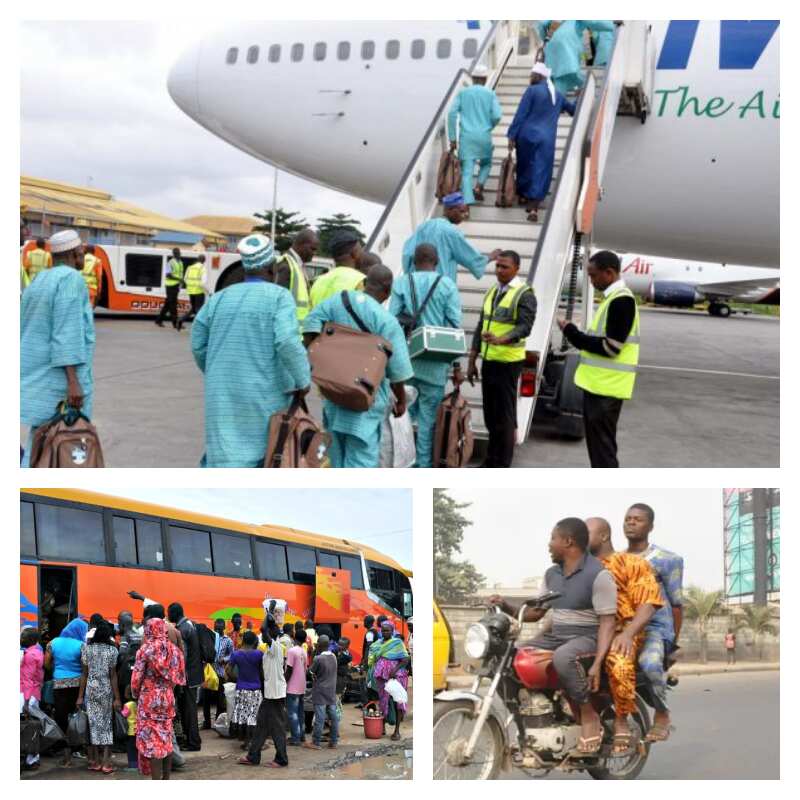Why Nigerians are Paying More for Transportation Costs in September 2022
- Nigerians have continued to lament the persistent increase in the cost of transportation in the country
- The increase in the transport index is largely driven by the surge in the price of energy including petrol, diesel and aviation fuel
- This year, road commuters and air transport passengers in Nigeria have had to deal with some of the most bedevilling issues in the transportation sector in recent times
PAY ATTENTION: Сheck out news that is picked exactly for YOU ➡️ find the “Recommended for you” block on the home page and enjoy!
The average fare paid by commuters for bus journeys within the city per drop increased by 2.19% on a month-on-month from N602.48 in August 2022 to N615.69 in September 2022. This is contained in the Transport Fare Watch for September 2022 released by the National Bureau of Statistics (NBS).
The Transport fare watch report for the month of September 2022 covered the following categories; bus journey within the city per drop constant route; bus journey intercity, state route, a charge per person; air fare charge for specified routes single journey; journey by motorcycle (Okada) per drop; and water way passenger transport.

Read also
CBN Spent N281 billion printing new notes as latest banknotes begin circulating December 15

Source: UGC
PAY ATTENTION: Share your outstanding story with our editors! Please reach us through info@corp.legit.ng!
Bus journey (intercity & Within city)
According to the report, in terms of year-on-year, the average fare paid by commuters for bus journeys within the city per drop rose by 41.42% from N435.36 in September 2021 to N615.69 in September 2022.
States with the highest bus journey fare within the city were Taraba (N820.70), Bauchi (N785.30) and Plateau (780.00); while States with the lowest bus journey fare within the city were Borno (N459.25), Anambra (N498.05), Kebbi (506.36)
The average fare paid by commuters for bus journey intercity per drop rose to N3,790.06 in September 2022 indicating an increase of 0.27% on a month-on-month compared to the value of N3,779.96 in August 2022. On a year-on-year, the fare prices rose by 44.61% from N2,620.90 in September 2021.
States with the highest bus journey fare intercity were FCT (N5,952.30), Adamawa (5,225.13), Gombe (N4,970.31); while States with the lowest bus journey fare intercity were Kwara (N1,697.20), Bayelsa (N2,450.22) and Zamfara (N2,496.30)
Air Travel
The average fare paid by air passengers for specified routes single journey, increased by 11.76% on a month-on-month from N65,041.89 in August 2022 to N72,690.54 in September 2022. On a year-on-year, the fare rose by 96.87% from N36,922.97 in September 2021.
States with the highest airfare in the review period were Delta (N76,500), Rivers (N76,000) and Cross River (N75,850). States with the lowest airfare in the review period were Niger (N65,000), Abia (N65,500), FCT (N69,700)
Commercial motorcycle (Okada)
Despite the ban on commercial motorcycles in some parts of the country, the medium of transportation remains a popular one amongst low and mid-income earners, especially when they need to overcome traffic congestion. It also serves the advantage of navigating roads that are not accessible to cars and buses in rural areas.
The average transport fare paid on Okada transportation was N434.73 in September 2022 which was 1.15% lower than the rate recorded in August 2022 (N439.80) on a month-on-month basis. While on a year-on-year, the fare rose by 41.79% when compared with September 2021 (N306.80).
States with the highest journey fare for motorcycle per drop include Kwara (N720.00), Yobe (N657.25) and Lagos (N655.47), while States with the lowest journey fare for motorcycle per drop include Sokoto (N120.17), Edo (178.21) and Bayelsa (N180.00).
Waterways
The average fare paid for water transport (waterway passenger transportation) in September 2022 increased to N980.18 showing a growth of 0.61% on a month-on-month basis, from N974.26 in August 2022. On year-on-year, the fare rose by 15.44% from N849.06 in September 2021 to N980.20 in September 2022.
States with the highest average fare by waterway passenger transport in September 2022 include Delta (N3,280), Rivers (N2,955.00) and Bayelsa (N2,800.00) while States with the lowest average fare by waterway passenger transport were Borno (N350.00), Kebbi (N414.00) and Gombe (N425.00)
Why transport fares continue to rise in Nigeria
The increase in the transport index is largely driven by the surge in energy prices – diesel prices hit a record high across the country, the same as Jet A1 fuel or aviation fuel. This year, road commuters and air transport passengers in Nigeria have had to deal with some of the most bedevilling issues in the transportation sector in recent times.

Read also
Dangote, Otedola, Adenuga, 12 other Nigerian billionaires lose N799 billion in three months
For several months in the early part of the year, Nigerians had to deal with the scarcity of premium motor spirit, otherwise known as petrol, occasioned by the importation of contaminated fuel. This situation, apart from having motorists queuing for days to get the product, forced the hike in the price which transport operators transferred to a surge in their fares.
Even though the government was able to sort out the problem and stabilise the system in about 3 months, floods caused by heavy downpour in the rainy season and resultant traffic gridlocks tends not to have helped the situation.
The average retail price of diesel in August 2022, according to NBS data, was N786.88 per litre, indicating a 209.54% increase from an average retail price of N254.21 in August 2021.
The ban on okada in many states this year has also contributed to heightened demand for bus transportation within cities, resulting in a significant hike in fares.

Read also
Diezani loses Abuja properties, cars worth N1.6bn as court gives final forfeiture order, photos of mansions emerge
Air transportation on the other hand continues to suffer as airfares have continued to surge as a result of the increase in the cost of aviation fuel and the depreciation of the exchange rate against the US dollar.
The future of transportation costs in Nigeria
The transportation sector constitutes one of the major features of the economic development of any country. Nigerians continue to pay more for transporting themselves and conveying goods from one place to another.
The latest figures dished out by the NBS indicate that Nigerians spent more on transport costs in September 2022 compared to the corresponding period of 2021, which is also reflected in the core inflation reported in September 2022.
According to the recent Consumer Price Index (CPI) report published by the NBS, Nigeria’s inflation rate surged to 20.77% in September 2022, up from 20.52% recorded in August 2022.
Speaking earlier in the year during the Central Bank of Nigeria's first monetary policy committee meeting, the apex bank's governor, Godwin Emefiele identified high transportation costs as one of the major causes of the surge in food inflation in Nigeria.
Source: Legit.ng


